The Trust-Fund Recovery Penalty—An exception to limited liability.
Many business owners form a limited liability entity (an “LLE”) such as a corporation or limited liability company (as LLC), to protect their personal assets from exposure to business liabilities. While forming an LLE is a prudent business decision, it is important to realize that they do not protect against ALL business liabilities. There are important exceptions, and one of the most important is a business owner’s potential personal liability for unpaid employee payroll taxes. This used to be referred to as the 100% Penalty, and is now known as the Trust-Fund Recovery Penalty (the “TFRP”).
Section 6672 of the Internal Revenue Code permits the IRS to assess the TFRP against any person responsible (a “Responsible Person”) for collecting, accounting for, or paying over the trust-fund portion of payroll taxes who willfully (“Willfulness”) fails to do so. Here are a few basics you should understand.
A Responsible Person could be anyone in the business with the authority to decide what bills get paid, and when they get paid. Responsible Persons can include officers, directors, controlling stockholders, lenders, bookkeepers, and anyone who exercises sufficient control over the business.
A trust-fund tax is the employee’s share of FICA and the employee’s withheld income taxes. The employer’s share of FICA, FUTA, penalties (i.e. failure to deposit, failure to file, failure to pay), and interest are NOT trust-fund taxes.
Willfulness does not require evil intent, malice, or even knowledge that there is potential personal liability. It requires only that the person authorizes a payment of another bill at a time when a trust-fund tax is overdue.
The TFRP Penalty is NOT DISCHARGEABLE in bankruptcy, but there are many things that can be done to avoid or limit your exposure.
When the IRS revenue officer conducts an investigation to identify Responsible Persons, they complete and ask the persons interviewed to sign a form 4180, Interview of Potentially Responsible Person.
Contact The Kauffman Group for your Tax Needs
Trust-Fund Recovery Penalties should not be taken lightly, as they can quickly accumulate into the hundreds of thousands or even millions of dollars. I have represented hundreds of individuals in trust-fund penalty investigations, appeals, and litigation. If you would like to read more about these Trust-Fund Recovery Penalty, click here. Or if you’d like to schedule an appointment to discuss your personal situation, click here.



